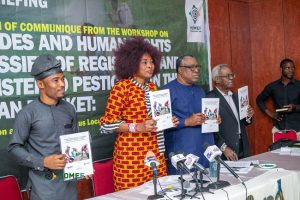The Alliance for Action on Pesticides in Nigeria (AAPN) with the support of the Health of Mother Earth Foundation (HOMEF) has presented a dossier shedding light on the widespread use of pesticides in the Nigerian market.

With a comprehensive analysis of registered and unregistered pesticides, the report, which was unenveiled in Abuja at media briefing held on December 7, 2023, emphasises the crucial need for transparency and regulatory measures to safeguard public health and the environment.
The dossier begins by championing the “Right to Know,” asserting that individuals have the inherent right to access accurate and comprehensive information about the chemicals they are exposed to. It underscores the significance of informed choices in contemporary agriculture, where pesticides play a vital role in improving crop yield and contributing to food security.
The report argues that the three factors determining the likelihood of pesticide-related problems – exposure level, pesticide toxicity, and access to comprehensive information – underscore the importance of transparency and regulatory measures.
The dossier’s findings are reportedly alarming, revealing that 47% of active pesticide ingredients in Nigeria are banned in Europe. Moreover, 83.3% of the analysed pesticides are classified as Highly Hazardous Pesticides (HHPs), presenting a clear threat to both human health and the environment.
The report categorises 16 insecticides, nine herbicides, and five fungicides as Highly Hazardous, a matter of concern given their prevalence in Nigerian agriculture. Disturbingly, 60% of the active ingredients are linked to cancer, while 73% are identified as endocrine disruptors. 63% of the active ingredients are toxic to the immune system, 60% are very toxic to the neurosystem – nervous system of mammals, while 60% of the active ingredients are toxic to reproductive system and fetus (unborn offspring).
These active ingredients are in agrochemical pesticides used in farming and storage, as well as household insecticides and fumigants.
In response to these alarming findings, the AAPN puts forth a set of recommendations directed at relevant stakeholders, urging regulatory bodies to adopt international guidelines on pesticide management. Specifically, the National Agency for Food and Drug Administration and Control (NAFDAC) and the Federal Ministry of Agriculture and Rural Development (FMARD) have been called upon to enforce a comprehensive prohibition on the importation of internationally banned pesticides.
The dossier advocates for a phased-out approach to Highly Hazardous Pesticides (HHPs) and emphasises the need for stringent enforcement against unregistered sales. Furthermore, it calls for the promotion of safer alternatives, such as organic/biopesticides and Integrated Pest Management (IPM) approaches.
The AAPN concludes with a resounding call to action, urging collective efforts to ensure the safety of the environment, public health, and sustainable agricultural practices. The report highlights the significance of encouraging the adoption of safer alternatives that minimise harm.
According to the Alliance, the unveiling of the pesticide dossier marks a crucial step towards raising awareness and fostering positive change in Nigeria’s agricultural landscape.
“As citizens, it is our collective responsibility to champion transparency, support regulatory reforms, and actively participate in building a safer and healthier agricultural future. Together, let us embrace sustainable practices that ensure the well-being of our communities and the preservation of our environment,” stated the Alliance.
